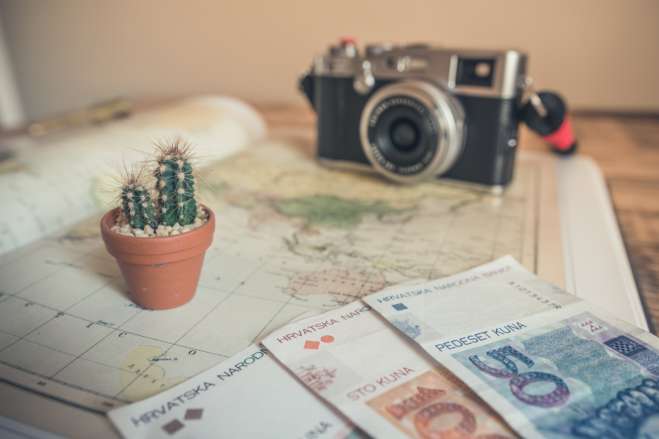
Let’s talk about saving money. You really do have many opportunities to embrace lower-cost living while traveling — opportunities that you might not get from a stationary lifestyle.
But we’re not talking about tactics. We’re talking about principles, because tactics are always changing and evolving (thanks to many factors, predominantly technology).
With principles, though, it’s more about the evergreen mindset that naturally brings about lower-cost living. Here, we break down the mindset into 10 hacks.
Check out the pod — Subscribe on Stitcher, iTunes, or Spotify!
1. Do more travel and less work
This feels a bit counterintuitive, but the more serious your work becomes, the more you’ll have to invest in things you wouldn’t spend money on as a free bird. The idea over here is that when you’re working you need strong internet, better accommodation, higher-quality workplaces and meeting spaces, expensive laptops & other devices, and so on…
Essentially, you need stability. And stability costs money — in travel and in life.
When you’re working on a consuming career, you have to throw money at the infrastructure for it. But if you’re a free spirit, you can do a lot of interest things: Couchsurfing, sleeping in a hostel dorm, camping, etc…
Remind yourself that your work is not just there to make money; it also forces you to spend money.
(And I love work, personally. But this is something you have to realize and be honest about).
2. Stay longer
The longer you stay, the more money you can stay per day. Why? Because staying longer can give you much better deals for accommodation. People really love when tenants stay longer term so they don’t have to substitute, and this plays into our hands as long-term travelers.
This also lets you close your information gaps! Just imagine: On the first day, you have to figure out questions like where to eat, where to work, how to use public transport, right? But these things all take time to discover. After 30 days, though, you’ll be so much smarter than you were on day one. This gives you more value from your environment and, in turn, lets you be more economical and careful with spending.
By the way, flight costs also benefit here: The longer you stay, the more your flight expenses decrease. One way you can think about it is that if you spend two months in Las Palmas instead of one month, your flight-ticket-cost-per-day is half as much.
3. Be flexible on when and where
The more flexible you are, the more anti-fragile you are. And the more you put yourself in a situation with many options — including the cheapest one.
This flexibility doesn’t just let you save money on flights (by flying the cheapest flight available), but also on many other things. Accommodation (as mentioned above), location (i.e. different places, or even proximity to city center), timing (i.e. traveling during off-season) — all great opportunities for lower-cost living while traveling.
4. Cost arbitrage
This is the one we’ve mentioned the most here because it’s most effective. Medellin, Chiang Mai, Bali, Kiev — all these locations offer high quality of life with much lower cost than in the West. It makes tons of sense to do some research to find if you can go to one of these low-cost locations.
I can’t exaggerate how much this has an impact on your expenses and quality of day-to-day life.
I do want to say that no matter where you are, you’re typically going to end up spend similar amounts. That’s just what I’ve found. But what will differ dramatically is how far that money takes you.
Especially because, personally speaking, going to high-cost places forces us into a hyper-aware mindset regarding expenses. In low-cost areas, though, we still end up spending a bunch because it’s just such good value all around.
So don’t expect to save much, necessarily, but do expect to improve quality.
5. Focus on revenue as long-term goal
The idea here is that if we’re going to live life only focused on expenses, it will be scarcity-driven. We’ll have missed opportunities and end up feeling restricted.
At the end of the day, there has to be some ingredient for improving our revenue. This is the real long-term plan for lower-cost living while traveling.
It can include some mindfulness like narrowing your expenses and smart spending, but it also has to actually increase revenue. And I say long-term because his does tend to take time. But we have time, and I believe that anyone with that ambition to get there can get there.
Each one of us is really good at something specific. I believe that. You are world-class at something in this world, it’s within you. And one of the games of life to discover what it is.
The beauty is that when you find it, society will compensate you. But first, you need to make it your goal to find it.
6. Travel together
There are advantages of traveling with another person — even in a group or a tribe. The most cost-effective travel I ever did was in China, when I managed to assimilate myself into a group of Chinese travelers. In those two weeks, I spent a record low on all the typical expenses!
The idea here is that life does give you financial rewards if you are not by yourself. There’s a practical reason, after all, why marriages are so popular: The financial element of several people sharing the same resource instead of just one person.
By the way, it’s not only accommodation: We’re also talking about renting a car and so on. You can pop over to this website to find out the best seller offers in renting a car. The beauty here is that society is changing it’s structure. There is now more and more of a sharing economy: Think of the rise of your Airbnbs and BlaBlaCars.
The more you connect to shared resources (which means traveling with someone or at least using this sharing economy), the better off you’ll typically be.
7. Understand that you’re not a tourist
By definition, you’re avoiding the touristic mindset of “I only have a few days in this location; I’m gonna rock it and have a lot of fun and then go back.” It’s not really sustainable as a nomadic approach. Nor is it conducive to lower-cost living while traveling.
When I get to a new place, I try to assimilate myself as a local from the first moment. That means avoiding taxis, buying groceries, cooking as much as I can — really trying to embrace the local mindset.
Of course, you might miss out on a little bit of touristy fun with this mindset, so you just have to make sure you don’t miss out on a lot of fun. There has to be a balance — a balance that works specifically for you and your unique preferences.
8. Be a minimalist
It makes a lot of sense; we want to move fast with as little weight on our backs as possible.
Minimalism includes arriving with less stuff but also buying less stuff while on the road. Rather, we want a few, reliable items of decent quality. By committing to this kind of approach, you keep your expenses to the necessary minimum in both the short- and long-term.
9. Focus on experiences, not on comfort
You should probably spend as much money on the experiences that make you happy. But try to avoid spending money on comfort — those 5-star hotels, posh restaurants, luxurious apartments, etc…
There is a reason that many (if not most) of the things we humans enjoy come for free. Love, human connection, nature, and so on. Things that really can’t be bought.
If you opt for comfort, it kinda shields you from the world. A saying that I’ve really taken to heart is “Try to be more in the world and less in yourself.” Being in yourself implies higher costs, that you’re trying to satisfy some inner desire or nagging pain. If you’re in the world, much of the world is still not monetized — a walk on the beach, a day at the park, a memorable conversation.
10. Try to avoid private space
… Because private space costs money, especially on your own. And there are a lot of public spaces that are cheap or low-cost.
Nature comes to mind, of course, if you love to camp or hike or just walk around. But even things like working in a public library instead of a coworking space or sharing an apartment instead of being alone in your own private castle.
This can be a way to both save money and encourage interaction by not shielding ourselves. And at the end of the day, this mindset tends to deliver satisfying, fulfilling experiences way more than the shielding mindset ever can.
We’ll cap off our discussion with one last reminder:
“Money won’t solve all your problems, but it will solve your money problems” — Naval Ravikant
What do you think? Are these ten principles comprehensive? We know we haven’t covered everything; what your some other fundamental mindset tips for lower-cost living while traveling? Let us know in the comments below!


Avoid private space? Been there, done that, got the t-shirt! I need privacy and it’s a luxury I am wilking to spend more on. Great post!